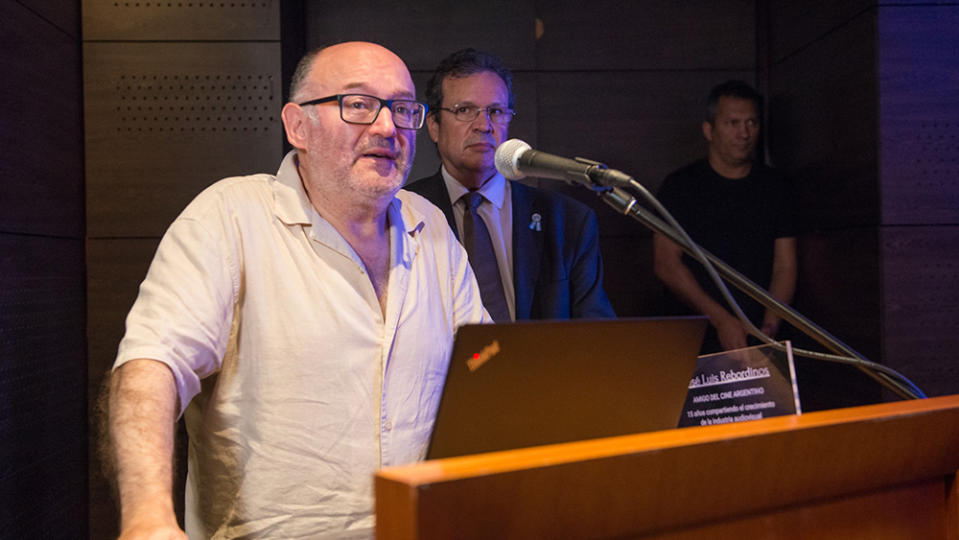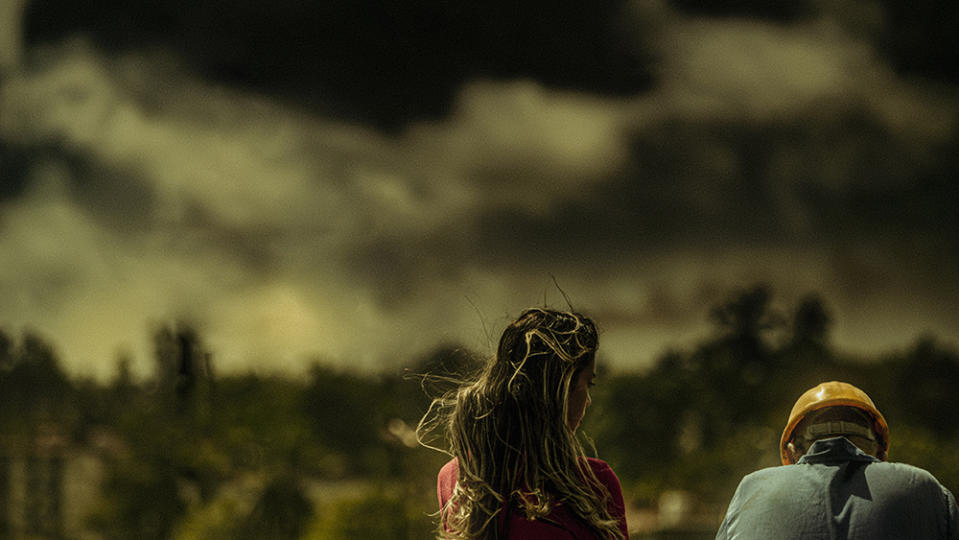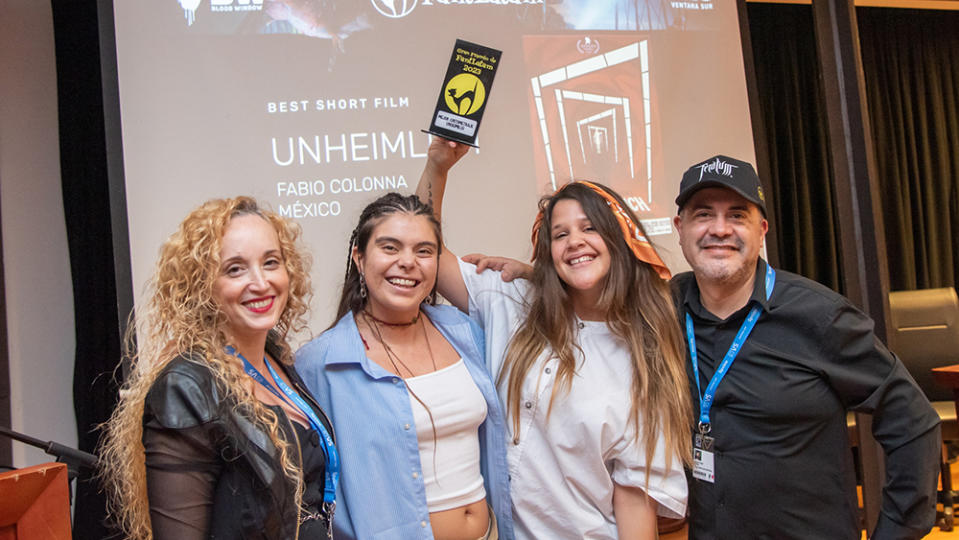Ventana Sur 2023: Major Narratives, from Frémaux, Rebordinos’ Support for Argentine Agency INCAA to the Seismic Pivot in International Business
- Oops!Something went wrong.Please try again later.

In bigger picture terms, the major highlights of Ventana Sur were a masterclass by Cannes head Thierry Frémaux and an impromptu speech by San Sebastián director José Luis Rebordinos, heads of the most important film festivals in the world and Spanish-speaking world, supporting the continued existence of INCAA. There words came after Argentinian President elect Javier Milei had vowed on the campaign trail to shutter Argentina’s state-backed film-TV agency if voted into power.
In industry terms, never has Ventana Sur been this big, its final attendance numbers sky-rocketing to 4,300, some 30% up on 2022, beyond even the wildest expectations of organizers, Cannes Marché du Film and the INCAA.
More from Variety
'The Cuban Doctor' Director Bernard Lessa Reflects on Winning Ventana Sur Paradiso WIP Award
Latin America's Industry Debates Ways Forward Towards Gender Parity
Put that down in part to new sections – Shoot the Book, Fantasmática, and Show Shorts – and enlargement of other sections, such as El Principio del Film and Solo Series. Latin America seems to have a bottomless well of new talent. The biggest reason, however, owes much to a seismic shunt in international business.
These and other major narratives at a mass-event Ventana Sur:
The Pivot
Ventana Sur launched in 2009 as a market, a primarily French, Spanish and German delegation of sales agents led by Wild Bunch and Pyramide Intl. hailing into Buenos Aires to view 12 titles from a Primer Corte curated by José María Riba, with Pyramide swooping on site on Michael Rowe’s “Leap Year,” which went on to win Cannes Camera d’Or.
14 years, one pandemic and 15 editions later, the world, international markets, even how film is often consumed, has changed. Co-production is now the name of the game. That paradigm shift has played out more notably than ever at this year’s Ventana Sur. 60% of sections are pitching sessions of projects looking for co-production, for instance, which demands onsite attendance. Hence in part the attendance spike.
Thierry Frémaux, José Luis Rebordinos Stand by Argentina’s INCAA
Both appealed implicitly to Argentinians’ sense that, though Argentina is located at the tip of South America, it belongs to the first world. “Economists know it’s key to support national industries. Cinema, culture is a national industry, and there’s no shame in giving money to directors,” Fremaux argued in his Cannes Film Week masterclass. Receiving an unexpected – hence his casual garb –Special Recognition Award from Argentina’s outgoing Minister of Culture Tristán Bauer for his support of Argentina Cinema, Rebordinos concurred. “I represent a festival which accepts all kinds of ways of understanding the world, except for those which deny freedoms, go against culture, announce they will close a film institute,” he said Friday.

The INCAA’s Most Probable Challenge
Push may well not come to shove, however, unless Milei digs in about attacking state support for culture. To govern and get anything through Congress, however, Milei will depend on support from Mauricio Macri who, when president of Argentina, supported national cinema, as do French governments (to date), irrelevant of their political leaning. It may not have been coincidence that Frémaux mentioned in passing that French president Emmanuel Macron phoned him to talk about cinema. INCAA’s big challenge in 2024 may be 2023’s: Inflation. Given at the beginning of a year, its budget has been decimated by inflation this year. The real rub for Argentine filmmaking may be that for the country as a whole.

Buzz titles
A highly selective list. Of projects, there was good or great word on Blood Window’s “No Me Sigas” and “The Woman Who Dreamt Underwater,” in SoloSerieS on Netflix competition victor “Impermanence” and of Flixxo contenders, Argentina’s “Callback,” from Juan Francisco Chapur, produced by Agustin Maradei. The biggest buzz in Primer Corte was for Rigoberto Pérezcano’s “Lovers Fare Goodbye,” and Antonella Sudasassi Furnis’s “Memories of a Burning Body” in Copia Final, but PC’s “Drowned,” an upscale well-turned out horror film also had its fans. “Moa” co-won Proyecta, as Locarno’s Open Doors two years ago. The favourite at Maquinitas, “melding Metroidvania, base builders, and Blade Runner vibes,” said section head Daniel de la Vega, was shooter-sidescroller “Ghostless,” from Brazil’s Coffenauts.

Brazil: a Giant Stirs
Spearheaded by São Paulo City promotion board SpCine, São Paulo State and Cinema do Brazil and philanthropic org Projeto Paradiso, Brazil’s Country of Honor focus highlighted how Brazil is beginning to come back to the table post-pandemic. A panel Monday presented an overview, including São Paulo’s pioneering cash rebate. On Wednesday, another panel, São Paulo – Audiovisual State, homed in on the State of São Paulo, with a population slightly bigger than Argentina’s. In a first big move, the State has received R$365 million ($74.5 million), 70% for the audiovisual sector, said André Sturm, Cinema do Brasil chair. Winners of 15 feature film incentives will be announced shortly, each receiving R$6 million ($1.2 million) to create “strong, larger and consistent films,” said Liliana Crocco, co-ordinator of promotion at the São Paulo State’s Secretary of Culture, Economy and Creative Industry. Thanks to its established incentives and the Paulo Gustavo Law, São Paulo State is tripling direct subsidies for the sector, she confirmed.

Film Sales: The Rub
Ventana Sur’s co-pro scene fairly rocked. Led by Proyecta, its pitching sessions provided a platform for literally several hundred projects, often from young first feature directors or TV series creators.
“There’s a lot of new talent, of new voices in Latin America,” said MPM Premium’s Quentin Worthington.
A late flurry of early sales off Ventana Sur kicked in from later in the week, led by Latido’s pick up of Alejandro Agresti’s “Lo Que Quisimos Ser,” an achingly poignant romantic dramedy if the film captures the spirit of its synopsis, with a major territory sale already in the offing.
That said, screenings outside official pix in post sections such as Primer Corte and Copia Final were sparsely attended, sales agents complained. The main market narrative, moreover, was at least discreet sales, with more titles being brought onto the market than being taken off it through distribution deals. Several factors are at work. “In my opinion, the general sentiment of buyers, sales agents, is that for acquisitions purpose, they’re happy here to connect with producers and distributors rather than screen films presented in the different sections,” Worthington told Variety at Ventana Sur. The sales cycle, moreover, is so slow that most deals close weeks or months after physical markets. One reason for that is that Ventana Sur was bedevilled by the same factor working against Toronto and the AFM: Contracting film sales in Europe to incumbent commercial networks whose ad revenues are plunging, leaving theatrical distributors with little to no safety net in ancillary if theatrical fails. Sales agents on art films are anyway way down the food chain of potential deals to big networks in the best of times. Platforms usually buy farpotentially bigger viewer fare.
Market Reaction
The market is, however, reacting. Many sales agents at Ventana Sur now focus on tying down titles ever earlier in development. Companies are leaning into IP, and making sure movies are fully-packaged when brought to market, or moving into more mainstream fare (Meikincine, Latido) or genre (Latido, again), prevalent at the AFM, or expanding their documentary business, where demand is growing at broadcasters’ VOD platforms, Ampere Analysis observed at Conecta Fiction. Beyond São Paulo State, other institutions in Spain and Latin America are looking to back a select number of bigger titles (Catalonia’s ICEC in high-end TV series). Just two weeks before Ventana Sur, moreover, Argentina’s Zeppelin Studio announced Lucía Puenzo’s upcoming “The Gunwoman (Pepita’s Legend)” backed by a total eight production companies. Expect such production grand alliances to grow.
Latam Femme Genre
Though ranging far and wide, Ventana Sur’s lineup, both projects and screenings, was spangled by what is proving one of the most potent mixtures in cutting-edge Latin American film: Genre, ambition, and a first-feature young woman director, screenwriter or budding female producers. That combination provided some of the most exciting titles at Ventana Sur, whether Ximena García Lecuona’s “No Me Sigas,” or Carla Sierra and Ale García’s “The Woman Who Dreamt Underwater,” or, among screenings, Caribbean sci-fi thriller “Aire,” or “Yellowcake,” from Caerá writer-directors Estevam and Ximenes, part of a highly impressive Pitching Paradiso lineup, or “Unheimlich,” a Freudian nightmare directed by Fabio Colonna but produced by Mexico’s Arantxa Suárez, which won best short at Sitges in 2021 and now concluded its triumphant festival/market run scooping best short at Blood Window’s Fant.Latam.

A Shout Out for Bernardo Bergeret
Some 15 years ago, Ventana Sur co-director Bernardo Bergeret, then INCAA head of international, took to Cannes’ Thierry Fremaux and Marché director Jérôme Paillard the idea of launching a film market in Buenos Aires, teaming Cannes and INCAA. Ventana Sur rapidly became the most important film-TV mart-meet in Latin America. He also spearheaded Blood Window, a pioneering genre forum at a major event, and with Paillard built the current Ventana Sur, which has expanded along growth axes for the industry such as animation, TV, IP and video games. Now teaming well with Cannes Marché du Film head Guillaume Esmiol, Ventana Sur’s other co-director who exported highly successfully Cannes format Shoot the Book Ventana Sur, Bergeret, is now a remarkable 82. Many people at his age would be eying easy golf courses. His expertise and imagination, however, are still very much needed at not just Ventana Sur but as Argentina may be facing an international festival makeover.

The Deals
These days, market business comes in three waves, if sellers are lucky: A flurry of pick-up and, ever more, co-pro reveals as companies build to bring titles onto the market; targeted announcements during the market; on-site deals which kick in as it rounds into its final bends. 2023’s Ventana Sur had all three. 20 of the market’s deals all announced in exclusivity by Variety:
*The big one: At Ventana Sur, Latido Films closed sales rights on “Lo Que Quisimos Ser,” a heart-on-it-sleeve romantic dramedy from Alejandro Agresti, one of Spain’s most internationally ambitious directors, and the biggest theatrical proposition at Ventana Sur.
*When Evil Lurks’”Demián Rugna, little short of a pop star mobbed at a Cine.Ar presentation during Ventana Sur, has in the works “Genetic,” teaming by longterm Argentine AD Martín Amoya. Variety revealed the project in the lineup of this year’s Tinta Oscura competition.
*Buenos Aires-based boutique sales agency Compañía de Cine has snagged “Pirópolis,” from Chile’s Nicolás Molina, part of Ventana Sur’s Doc Sur sidebar and a Visions Du Réel 2023 VdR- Work-in-Progress Award winner.
*Gael García Bernal, Diego Luna and Isabel Coixet feature among first Ibermedia Next funding winners. Luna and García Bernal are set to produce and voice the VR “El Origen De La Experiencia,” an immersive take on Mexican mysticism: Coixet will direct “Sophia (Sofía),” with Milena Smit, star of Pedro Almodóvar’s “Parallel Mothers.”
*Habanero Film Sales pounced in Buenos Aires on Magma Cine doc ‘I Trust You,’ directed by Agustin Toscano, whose “The Snatch Thief” played Cannes’ Directors’ Fortnight sidebars in 2017.
*Also in Buenos Aires, Magma formally closed a co-production deal for upcoming series “Box 205,” produced by Chile’s Storyboard Media, and one of the key titles in a big bold spread of Chilean series at Ventana Sur.
*Colombia’s Doc:Co, a success in domestic distribution, ventured into the global sales arena with its first international pick up, “Otra Piel,” co-produced by Chile’s Cine Matriz, founded by producer Gabriela Sandoval who co-runs Storyboard Media.
*ZDF is set to produce “Marriage by Abduction,” directed by Sophia Mocorrea and building on her short “The Kidnapping of the Bride” which took accolades at both Berlin and Sundance. One of the highest profile projects at Proyecta, “Marriage by Abduction” is lead produced by Nicole Gerhards’ NiKo Film.
*Spain’s Sideral boarded Ventana Sur-Blood Window dark comedy, “Capital Variable,” the feature debut of Uruguayan helmer-scribe Marco Caltieri, it announced at the beginning of Ventana Sur.
*Cuba’s Jorge Perugorría, best known for his career-launching perf in the Oscar-nominated “Strawberry & Chocolate,” “Slumdog Millionaire” line producer Tabrez Noorani and ‘The Iceman’ helmer Ariel Vromen have boarded Havana-set “Malecón” as executive producers. Director-writer Flavio Florencio (“Made in Bangkok”) produces.
*Leading Chilean TV producer María Elena Wood, whose multiple credits include “News of a Kidnapping,” “Ramona” and “Dignity,” is developing a follow up to her company’s latest hit documentary “Operation Chile: Top Secret.” Wood has also ventured into animation, partnering on “Lucila,” a prize-winner at this year’s Animation! Pitching Sessions. Both titles were brought onto the market at Ventana Sur.
*Chile’s pioneering fantasy/horror filmmaker Jorge Olguín is venturing into series-making for the first time with “Kalkutún: Trial of the Witches.” Backed by CNTV, Chile’s National Television Council, the series participated in Ventana Sur’s SoloSerieS and Blood Window sections.
*David Matamoros has tapped financing from Spain’s ICAA, Argentina’s INCAA, Uruguay’s PUA and Catalan pubcaster TV3 for queer romcom “Astronaut,” now in post and set for delivery in early 2024.
*In a notable prestige project package from Chile, Gonzalo Maza, co-writer of Sebastian Lelio’s Academy Award-winning “A Fantastic Woman,” has boarded “I Don’t Know How to Say Goodbye,” a drama thriller non-fiction series to be directed by Carola Fuentes and exec produced by Marcela Said.
*São Paulo-based impact producer Maria Farinha Films, behind Globoplay hit “Aruanas” and one of the global South’s key impact entertainment companies, has boarded Marcel Beltrán’s mystery drama “Moa,” the biggest winner at Locarno’s 2022 Open Doors which shared top honors at Ventana Sur’s Proyecta showcase, announced on Friday.
*Brazilian talents to track Enock Carvalho and Matheus Farias, selected for 2021’s Sundance with short “Unliveable,” are teaming with Janaina Bernardes, a co-producer of Karim Ainouz’s “Nardjes A.” and Argentina’s Frutacine, behind Tribeca player “Initials S.G.,” to produce “Burning Land” the directors’ awaited feature debut.
*Tessa Ía, who broke out heading Michel Franco’s “After Lucía” is set to star in “Hyperballad,” directed by Alejandra Villalba García, a standout at Ventana Sur’s Proyecta co-pro platform.
*Belgium-based Joachim Lafosse producer Stenola Prods. Is set to co-produce Dalia Huerta Cano’s “Elena,” written by Cannes Camera d’Or winner César Díaz (“Our Mothers”) and another quality title in Proyecta.
*Chosen as one of Variety’s 10 Screenwriters to Watch 2022, Ximena García Lecuona, the Mexico City-based writer of Billy Porter’s “Anything’s Possible,” has set her directorial debut “No Me Sigas,” a Spanish-language chiller with a shocking final twist, revealed to Variety and then unveiled at Blood Window.
García Lecuona will direct with brother Eduardo Lecuona. The smart genre horror thriller is set up at Mexico City’s Maligno Gorehouse.
*Fotosíntesis Media, a Mexican pioneer in cause-driven entertainment, unveiled to Variety “Ch’ulel,” a 2D fantasy adventure animated feature for 6-8s tapping into the mindset of Tzeltal community, before presenting in Buenos Aires at Animation!

Best of Variety
Sign up for Variety’s Newsletter. For the latest news, follow us on Facebook, Twitter, and Instagram.

